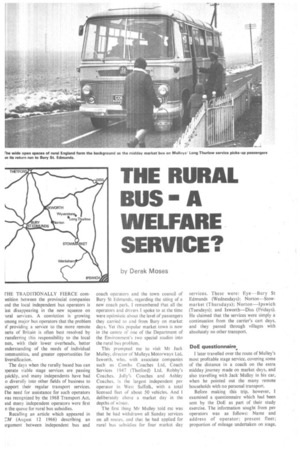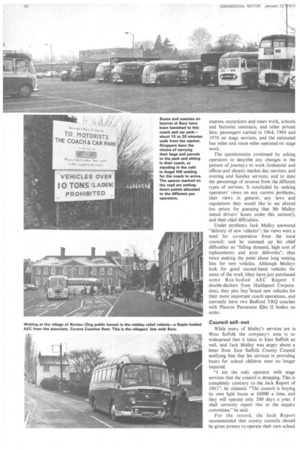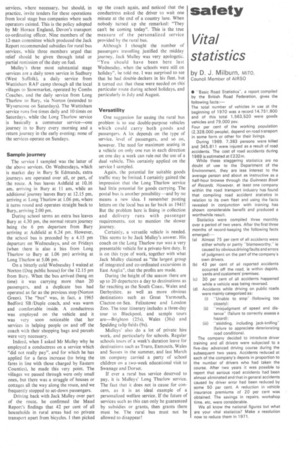THE RURAL BUS A WELFARE SERVICE?
Page 41

Page 42

Page 43

If you've noticed an error in this article please click here to report it so we can fix it.
by Derek Moses
CHE TRADITIONALLY FIERCE corn)etition between the provincial companies tnd the local independent bus operators is 'ast disappearing in the new squeeze on vral services. A conviction is growing tmong major bus operators that the problem )f providing a service to the more remote 'arts of Britain is often best resolved by rartsferring this responsibility to the local nen, with their lower overheads, better mderstanding of the needs of individual :ommunities, and greater opportunities for liversification.
The days when the rurally based bus can )perate viable stage services are passing iuickly, and many independents have had o diversify into other fields of business to iupport their regular transport services. rile need for assistance for such operators as recognized by the 1968 Transport Act, Ind many independent operators were first n the queue for rural bus subsidies.
Recalling an article which appeared in M (August 12 1966) describing an trgurnent between independent bus and coach operators and the town council of Bury St Edmunds. regarding the siting of a new coach park, I remembered that all the operators and drivers I spoke to at the time were optimistic about the level of passengers they carried to and from Bury on market days. Yet this popular market town is now in the centre of one of the Department of the Environment's two special studies into the rural bus problem.
This prompted me to visit Mr Jack Mulley, director of Mulleys Motorways Ltd, Ixworth, who, with associate companies such as Combs Coaches Ltd, Coach Services 1947 (Thetford) Ltd, Robby's Coaches, Jolly's Coaches and Ashley Coaches, is the largest independent psv operator in West Suffolk, with a total licensed fleet of about 50 vehicles. And I deliberately chose a market day in the depths or. winter.
The first thing Mr Mulley told me was that he had withdrawn all Sunday services on all routes, and that he had applied for rural bus subsidies for four market day services. These were: Eye—Bury St Edmunds (Wednesdays); Norton—Stowmarket (Thursdays); Norton—Ipswich (Tuesdays); and Ixworth—Diss (Fridays). He claimed that the services were simply a continuation from the carrier's cart days, and they passed through villages with absolutely no other transport.
DoE questionnaire.
I later travelled over the route of Mulley's most profitable stage service, covering some of the distance in a coach on the extra midday journey made on market days, and also travelling with JackMulley in his car, when he pointed out the many remote households with no personal transport.
Before making this trip, however, I examined a questionnaire which had been sent by the DoE as part of their study exercise. The information sought from psv operators was as follows: Name and address of operator; present fleet; proportion of mileage undertaken on stage, express, excursions and tours work, schools and factories contracts, and other private hire; passengers carried in 1964, 1969 and 1970 on stage services, and the estimated bus miles and route miles operated on stage work.
The questionnaire continued by asking operators to describe any changes in the pattern of journeys to work (industrial and offices and shops); market day services; and evening and Sunday services; and to state the percentage of revenue from the different types of services. It concluded by seeking operators' views on any current problems; their views in general; any laws and regulations they would like to see altered (no prizes for guessing that Mr Mulley stated drivers' hours under this section!); and their chief difficulties.
Under problems Jack Mulley answered "delivery of new vehicles"; his views were a need for co-operation from the local council; and he summed up his chief difficulties as "falling demand, high cost of replacements and poor deliveries", thus twice making the point about long waiting lists for new vehicles. Although Mulleys look for good second-hand vehicles for some of the work (they have just purchased some Roe-bodied AEC Regent V double-deckers from Hartlepool Corporation), they also buy 'brand new vehicles for their more important coach operations, and currently have two Bedford YRQ coaches with Plaxton Panorama Elite II bodies on order.
Council sell–out
While many of Mulley's services are in West Suffolk the company's area is so widespread that it takes in East Suffolk as well, and Jack Mulley was angry about a letter from East Suffolk County Council notifying him that his services in providing buses for school children were no longer required.
"I am the only operator with stage services that the council is dropping. This is completely contrary to the Jack Report of 1961", he claimed. "The council is buying its own light buses at £6000 a time, and they will operate only 200 days a year. I shall certainly report this to the inquiry committee," he said.
For the record, the Jack Report recommended that county councils should be given powers to operate their own school
services, where necessary, but should, in practice, invite tenders for these operations from local stage bus companies where such operators existed. This is the policy adopted by Mr Horace England, Devon's transport co-ordinating officer. Nine members of the 12-man committee which produced the Jack Report recommended subsidies for rural bus services, while three members urged that relief should be given through total or partial remission of the duty on fuel. MuIley's three most substantial stage services are a daily town service in Sudbury (West Suffolk), a daily service from Wattisham RAF camp through all the local villages to Stowmarket, operated by Combs Coaches, and the daily service from Long Thurlow to Bury, via Norton (extended to Wyverstone on Saturdays). The Wattisham service runs five times daily and 10 times on Saturdays, while the Long Thurlow service is basically a commuter service—one journey in to Bury every morning and a return journey in the early evening; none of the services operate on Sundays.
Sample journey
The service I sampled was the latter of the above services. On Wednesdays, which is market day in Bury St Edmunds, extra journeys are operated over all,. or part, of the route. A bus leaves Ashfield at 10.16 am, arriving in Bury at 11 am, while an additional journey leaves Bury at 12.15 pm, arriving at Long Thurlow at 1.06 pm, where it turns round and operates straight back to Bury, arriving 2.00 pm. During school terms an extra bus leaves Bury at 4.30 pm, the normal return journey being the 6 pm departure from Bury arriving at Ashfield at 6.24 pm. However, the school bus is preceded by a 4.15 pm departure on Wednesdays, and on Fridays (when there is also a hi's from Long Thurlow to Bury at 1.06 pm) arriving at Long Thurlow at 5.06 pm. On a bitterly cold Wednesday I waited at Norton (Dog public house) for the 12.15 pm from Bury. When the bus arrived (bang on time) it was carrying more than 20 passengers, and a duplicate bus had operated as far as the previous stop (Norton Green). The "bus" was, in fact, a 1965 Bedford SB /Duple coach, and was warm and comfortable inside. A conductress was employed on the vehicle and it was very soon noticeable that her services in helping people on and off the coach with their shopping bags and parcels were very necessary.
Indeed, when I asked Mr Mulley why he employed a conductress on a service which "did not really pay", and for which he has
applied for a fares increase (to bring the fares in line with those charged by Eastern Counties), he made this very point. The villages we passed through were only small ones, but there was a straggle of houses or cottages all the way along the route, and we frequently stopped to set-down passengers. Driving back with Jack Mulley over part of the route, he confirmed the Maud
Report's findings that 42 per cent of all households in rural areas had no private transport apart from bicycles. I then picked
up the coach again, and noticed that the conductress asked the driver to wait one minute at the end of a country lane. When nobody turned up she remarked: "They can't be coming today". This is the true measure of the personalized service provided by the rural bus. Although I thought the number of passengers travelling justified the midday journey, Jack Mulley was very apologetic. "You should have been here last Wednesday, when the schools were still on holiday", he told me. I was surprised to see that he had double-deckers in his fleet, but it turned out that these were needed on this particular route during school holidays, and particularly in July and August.
Versatility
One suggestion for easing the rural bus problem is to use double-purpose vehicles which could carry both goods and passengers. A lot depends on the type of service, level of passengers, and so on, however. The need for maximum seating in a vehicle on only one run in each direction on one day a week can rule out the use of a dual vehicle. This certainly applied on the service I sampled. Again, the potential for suitable goods traffic may be limited. I certainly gained the impression that the Long Thurlow service had little potential for goods carrying. The postal bus is another possibility—and by no means a new idea. I remember posting letters on the local bus as far back as 1941! But the problem here is fitting in collection and delivery runs with passenger requirements, not to mention the slower journey. Certainly, a versatile vehicle is needed. This seems to be Jack Mulley's answer. His coach on the Long Thurlow run was a very presentable vehicle for a private-hire duty. It is on this type of work, together with what Jack Mulley claimed as "the largest group of integrated and co-ordinated excursions in East Anglia", that the profits are made. During the height of the season there are up to 20 departures a day to destinations as far reaching as the South Coast, Wales and Derbyshire, as well as more obvious destinations such as Great Yarmouth, Clacton-on-Sea. Felixstowe and London Zoo. The tour itinerary includes a three-day tour to Blackpool, and sample tours are—Brighton (25s), Wales (36s) and Spalding tulip fields (9s). Mulleys' also do a lot of private hire work, and particularly for schools. Regular schools tours of a week's duration leave for destinations such as Truro, Exmouth, Wales and Sussex in the summer, and last March tm company carried a party of school children on a two-week educational visit to Swanage and Dorset.
If ever a rural bus service deserved to pay, it is Mulleys' Long Thurlow service. The fact that it does not is cause for concern, as it is an ideal example of a personalized welfare service. If the future of services such as this can only be guaranteed by subsidies or grants, then grants there must be. The rural bus must not be allowed to disappear!




































































































